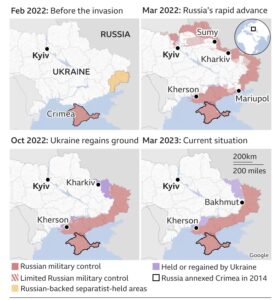Last week, I had the opportunity to attend a panel discussion reflecting on the Ukraine-Russia War after one year. The event, hosted by the Clarke Forum for Contemporary Issues, began with an examination of current ground conflict as illustrated by the maps below.

Image courtesy of the BBC: https://www.bbc.com/news/world-europe-60506682
Immediately, I was struck by the contrast of the rapid Russian invasion followed by the pushback of Ukrainian forces. When conflict originally broke out, predictions did not look favorably upon Ukraine’s ability to fight off the invading army, and for weeks the world watched, fearing the fall of the nation’s capital, Kyiv. Rather than such a tragedy occurring, however, Ukrainian forces were able to not only defend the capital but also reclaim some of their territory. But how did this occur? Why were predictions so wrong? I believe, in part, the miscalculation came from a failure to recognize the quiet impact of nationalism and global support. All too often, it is easy to examine conflicts based on state capabilities, but military assets are not the only factor in a war. People, and their will to fight, are equally crucial. The Ukrainian people were determined to protect their sovereignty, and this dedication was recognized globally, resulting in significant support from the West. At the same, as war raged on, support in Russia waned. Together, these factors helped to balance the scales, allowing, as one panelist pointed out, for Ukraine to “punch above their weight”.
Following the discussion of current realities, panelists turned to the question on everyone’s mind: is there a risk of escalation, and does it have the potential to turn nuclear? The answer, it turns out, goes back to the Cold War concept of Mutually Assured Destruction. As one professor explained, nuclear weapons have already shaped the conflict. Russia invaded Ukraine because they calculated the risk of escalation would keep the U.S. from interfering. At the same time, Russia was equally deterred by such a threat and so has not interfered with Western supply lines providing aid. Overall, it is clear long-range deterrence still holds, dictating both the action and inaction of nuclear states.
Localized use of nuclear force, however, is another question entirely, as Ukraine is unable to deter such an attack. Even still, the possibility of employment remains limited due to the concept of irredentism. In Putin’s mind, he is fighting to regain Russian land, and no leader would take action that could damage what is believed to be rightfully theirs.
Of course, there are possible outliers to these observations. If Russia were to lose control of Crimea, for example, it could trigger potentially devastating actions. As I have already mentioned, the domestic environment of a state can impact conflict. In the case of Russia, it is possible the loss of Crimea would greatly diminish Putin’s support. During the discussion, one panelist highlighted their belief it would end his regime entirely. In such an instance, facing such dire stakes, it is not impossible to imagine that, at the foreign policy level of analysis, domestic pressure and international stakes could interact in a way that makes current Russian leadership take previously unforeseen military action. At the end of the day, however, as two panelists observed, the threat of nuclear force remains small.
Following this conclusion, speakers moved to answer audience questions, many of which concerned the future for both states and how the conflict has impacted the international system at-large. The consensus seems to be that war has irrevocably changed the global environment, reminding all states of the possibility of future threats. Post-Cold War, or even prior, many had become more complacent in security, but with this new reminder, states have begun to build up their defenses once more, and while it is still minute in terms of NATO countries, we may begin to see larger and larger expenditures on military and national security.
All in all, the event was incredibly informative, and the conversation, paired with what I have learned over the past semester, allowed me to gain a better understanding of the Ukraine-Russia War today. The discussion also left me with several questions and newly formed ideas on what shapes the international system and influences state actors.
Special thanks to the Clarke Forum for Contemporary Issues and professors Bova, Deblasio, and Wolff for such an engaging night of reflection.
April 27, 2023 at 10:33 pm
I agree that the conflict seems to demonstrate the importance of paying attention to the domestic level of analysis (the “Second Image”)!